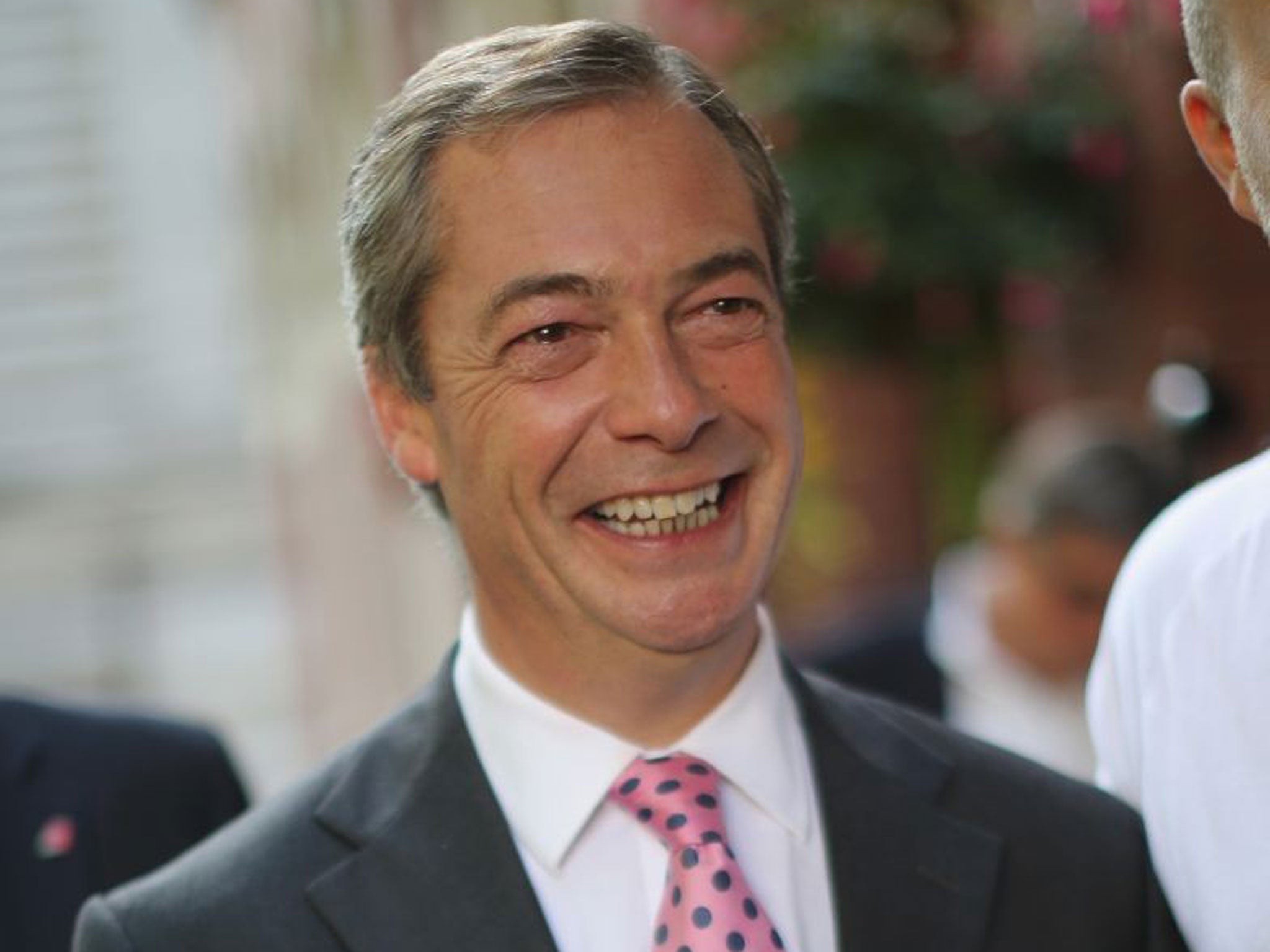The three main parties suffered in the polls this year. Only UKIP truly did well
Never before has a wholly independent fourth party enjoyed such support


This has, in truth, not been a good year in the polls for any of the three main Westminster parties. None can claim to have made significant progress. All have been left in the shade by the most serious independent fourth party incursion in British political history.
The year began with UKIP already enjoying an all-time record level of support (8%) following by-election and police commissioner election advances in the second half of 2012. That advance continued further in the early months of 2013, despite a promise from the Prime Minister in January that a future Conservative majority government would hold a referendum on Britain’s membership of the EU.
Major success in May’s local elections (held in the relatively favourable territory for the party of the English shires) saw the party’s support reach 15% in our poll of polls. Although its support has fallen back somewhat since, it has remained in double figures (and note our poll of polls does not include some of the internet polls such as those conducted by Opinium and ComRes which regularly put UKIP support at a higher level). Never before has a wholly independent fourth party (a description that excludes the SDP) enjoyed such a high level of popular support
At the same time throughout the year some 8-9% of voters have consistently reported backing one of the other smaller parties, most notably the Greens who are currently averaging 3%. All in all, around one in five of those with a current vote intention are backing a party other than Con, Lab or Lib Dem. The electoral foundations of the parties that currently dominate Westminster have never looked weaker than they do now.
Throughout the year UKIP’s advance has come disproportionately – but not exclusively – at the expense of the Tories. On average, in December 11% of those who voted Conservative in 2010 said they were now backing UKIP, compared with 6% of 2010 Liberal Democrats and 3% of Labour supporters. There is no doubt that UKIP’s success has, directly at least, hit the Conservatives’ hardest, and indeed more 2010 Tories have switched to UKIP than have done to any other party. The Tories’ future prospects would seem to rest heavily on pricking the UKIP bubble.
However, the other parties are not wholly immune from losses to UKIP. When UKIP was at its height in May, as many as 9% of 2010 Labour and Liberal Democrat supporters (together with 21% of Tories) were backing the party. Moreover, there are some signs that the degree to which UKIP support is coming disproportionately from former Tory supporters has diminished somewhat.
While the current rate of switching from Con to UKIP is, at 11%, much the same now as it was in Jan and Feb. this year, the rate of switching from both Lab and LD to UKIP has in the last couple of months been two points higher than it was in Jan and Feb. Meanwhile, we might wonder whether some of these switchers from Tory to UKIP might have switched to Labour instead if Labour had seemed a more attractive option – on which more below.
The Tories began the year at much the 32-33% level they had been ever since the ‘omnishambles’ of spring 2012 that had done so much to damage the party’s reputation for competent government. However, support slipped yet further in the spring in the wake of UKIP’s continued rise, briefly falling below the 30% level in March. That more recent loss was restored during the summer, but the party still ended the year on no more than 33%, that is in much the same relatively diminished place that they were at the beginning of the year.
Labour’s vote initially held firm, but gradually it too lost ground in the wake of UKIP’s slipstream, but unlike the Tories the party failed to recover this lost ground – despite having apparently seizing the political agenda in the autumn with its proposal for an energy price freeze. Thus although the party still ended the year in the lead, at five points this was much diminished from the 9 points lead it enjoyed in January (and the double digit leads it had in Feb and March).
This pair of disappointments raised profound questions about the ability of either party to put together a winning combination in 2015. Tory hopes of electoral recovery were raised by the emergence of the green shoots of economic recovery – and confidence. In March, MORI’s general economic optimism index stood at -30. By August it had leapt to +20 and still stood at +18 in December. The recovery in YouGov’s personal feelgood factor was less dramatic, but still not insubstantial, from -42 in Jan to -26 by the end of the year.
This return of a degree of economic confidence was accompanied by some improvement in the public’s confidence in the coalition’s handling of the economy. But it was more a question of degree rather than a transformation of perceptions. Thus, according to YouGov 38% now think the coalition is handling the economy well, compared with 30% at the end of last year. As many as 42% think the programme of deficit reduction is good for the economy, up from 33% in Dec. 2012. Even then according to ComRes the proportion who say they trust Cameron and Osborne to run the economy is, at 27%, still only two points higher now than it was 12 months ago.
Not only was the political fallout less than dramatic but, as the contrast between the MORI (general economy) and YouGov (personal economy) indices illustrates, people are less likely to be optimistic about their personal economic circumstances than those of the country as a whole. (And given how badly the economy was widely thought to be doing during the last two years, the baseline against which people are now more optimistic is hardly a demanding one.) Moreover, this is particularly true of those who are currently backing UKIP. UKIP supporters stand at -51 on the YouGov personal optimism index (compared with -26 amongst all voters). They stand at -12 on MORI’s general economic index (all voters +18). Meanwhile, ICM report that 72% of UKIP voters do not feel the recovery is benefitting them (all voters 70%).
We thus perhaps should not be surprised that while the economic recovery may have helped the Tories recoup the losses of earlier in the year the electoral dividend has so far not proven any more substantial than that. The recovery has yet to be felt by the older, far from affluent UKIP electorate that it would seem essential for the Tories to win back. It certainly suggests that Tory MPs should not be comforted too much by the fact that their party remains ahead of Labour on the economy; dissatisfied voters have decided that alternatives other than Labour are available instead.
Still, there is no doubt that Labour have continued to fail to enthuse much of the electorate about the prospect of Ed Miliband and his colleagues providing an alternative government. Just 19% now trust Miliband and Balls to run the economy, even less than the 21% who did so 12 months ago (ComRes). According to YouGov Labour now trails the Conservatves as the best party on the economy by 5 points, (26 vs. 31) as compared with just one point at the end of 2012 (27 vs. 28). When personalities are mentioned the gap between the two parties seems to be wider – and to have grown.
According to ICM 39% trust Cameron and Osborne more to run the economy compared with 23% who back Miliband and Balls. At the end of 2012 the gap on this question was 35% to 24%. YouGov report that Osborne is regarded as the better Chancellor than Balls by 32% to 22% now – compared with a lead of just 28% to 26% in May. Meanwhile MORI state that Osborne is now regarded as the more capable Chancellor by 40% to 29% - whereas a year ago the two were evenly tied on 34% each.
Miliband’s own personal reputation has also taken a battering, damage that his success towards the end of the year in pressing the case on energy prices and the cost of living only partially repaired. According to MORI his net satisfaction rating fell from a relatively good -3 in Dec. 2012 to an all time low of -36 in Sept and even now only stands at -25. YouGov found that his net doing well/badly rating was -22 in December 2012, fell to -46 in early Sept and even now is still only -34. Only one opposition leader with personal ratings anything like as poor as those enjoyed by Mr Miliband has eventually made it to 10 Downing St – Edward Heath. The failure of much of the public to regard today’s leader of the opposition as a potential Prime Minister cannot have helped the party in its so far failed efforts to restore its sometime double digit lead. Mr Miliband’s one consolation is that his principal opponent, Mr Cameron, remains relatively unpopular too (MORI net satisfaction rating -13, -19 in Dec. 12; YouGov net doing well/badly -16, -18 in Dec. 12.).In truth leadership does not look like a card that either of the two largest parties can currently play with confidence.
Still, we should remember that what has so far proven crucial to Labour’s fortunes in this parliament has not been the perceived relative merits of a Conservative versus a Labour government but rather people’s disappointment with the Liberal Democrats. Those who voted for the Liberal Democrats in 2010 continue to be the principal source of new recruits into Labour’s ranks. There had been some signs that this flow might be beginning to be reversed. Whereas between Nov 2012 and Apr. 2013, 35% of 2010 Lib Dem voters were now backing Labour, between May and October that figure had eased back to 30%. However, with the Liberal Democrats slipping back at the end of the year to rock bottom – in Nov and Dec. they registered 10% for two months in a row for the first time in our poll of polls – that figure rose back again to 35%. Much will depend in the next 18 months on the Liberal Democrats ability to wrest these voters back – all that can be said is that so far their increasingly shrill attempts to differentiate themselves from their coalition partners have failed to bring any electoral reward, while their party leader, Nick Clegg, remains as unpopular as ever. (MORI net satisfaction rating -29 in Dec. 13; -33 in Dec. 12; YouGov doing net well/badly -52, -56 in Dec. 12.)
In 2014 the Westminster parties enter what is always relatively difficult territory for them – European elections. Voters have previously demonstrated a relative willingness to leave their Westminster loyalties behind in such elections. Now that those loyalties look weaker than ever, the gap between the preferences of voters and the preoccupations of Westminster may be about to become even starker.
Join our commenting forum
Join thought-provoking conversations, follow other Independent readers and see their replies
Comments
Bookmark popover
Removed from bookmarks